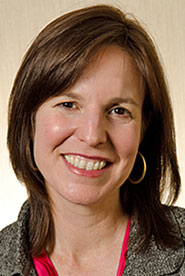Integrating cleaner energy into the existing infrastructure and strategies for new facilities to incorporate renewable energy will be explored in a Lawrence University science hall/economics colloquium.

Elizabeth Wilson, professor of energy and environmental policy and law at the University of Minnesota, presents “Remaking Energy: Creating Sustainable Electricity Systems” Monday, May 16 at 4:30 p.m. in the Wriston Art Center auditorium. The talk is free and open to the public.
Wilson’s research focuses on the implementation of energy and environmental policies and laws. She studies how institutions support and thwart energy system transitions, focusing on the interplay between technology innovation, policy creation and institutional decision making.
Her most recent research has examined how energy policy stakeholders view the opportunities and challenges of decision-making within Regional Transmission Organizations and creating smart grids. RTOs currently manage the transmission planning, electricity markets and grid operations for more than 70 percent of North America.
Wilson was awarded a 2015 an Andrew Carnegie Fellowship that will support research in Denmark, Germany and Spain of their energy systems, which include high levels of renewable resources as well as nuclear policies and electric grid architectures different than the United States.
She is the co-author of the 2015 book “Smart Grid (R)Evolution: Electric Power Struggles” and the 2014 book “Energy Law and Policy.”
A former employee of the U.S. Environmental Protection Agency, Wilson spent a year as a visiting scholar in China at Beijing’s Tsinghua University and also has worked in Belgium, Burundi and Tanzania. She earned a Ph.D. from Carnegie Mellon University in engineering and public policy.
About Lawrence University
Founded in 1847, Lawrence University uniquely integrates a college of liberal arts and sciences with a nationally recognized conservatory of music, both devoted exclusively to undergraduate education. It was selected for inclusion in the book “Colleges That Change Lives: 40 Schools That Will Change the Way You Think About College” and Fiske’s Guide to Colleges 2016. Engaged learning, the development of multiple interests and community outreach are central to the Lawrence experience. Lawrence draws its 1,500 students from nearly every state and more than 50 countries.